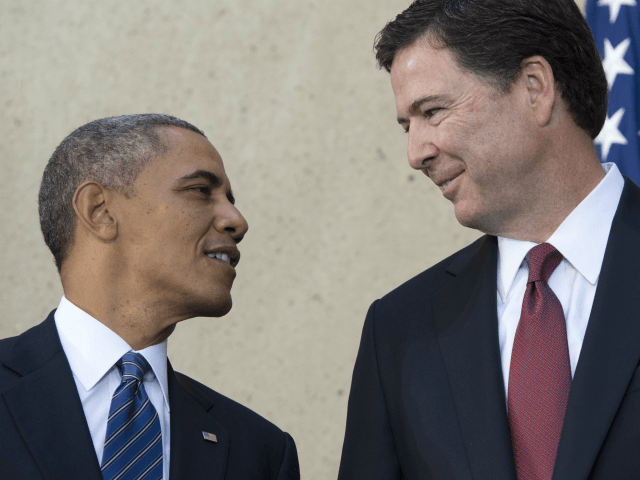The FBI missed opportunities to stop homegrown jihadis from killing and injuring Americans between November 2009 and January 2017,under the Obama administration and the leadership of the agency’s former director James Comey, an audit released this week by the inspector general (IG) at the Department of Justice (DOJ) revealed.
On Wednesday, Michael Horowitz, the DOJ IG who serves as the department’s internal government watchdog, reported:
The FBI has acknowledged that various weaknesses related to its assessment process may have impacted its ability to fully investigate certain counterterrorism assessment subjects who later committed terrorist attacks in the United States. Following these attacks, the FBI made various efforts to evaluate and improve its assessment process. However, it has not ensured that identified areas for improvement were formalized and implemented into enhanced policies and procedures.
…
During our audit, we found at least six attacks committed in the United States by individuals who the FBI had previously assessed or investigated and who were subsequently categorized as HVEs [homegrown violent extremists].
The FBI reportedly defines “HVEs as global jihad-inspired individuals who are in the United States, have been radicalized primarily in the United States, and are not receiving individualized direction from a foreign terrorist organization (FTO).”
Horowitz identified the six attacks by individuals who were under the FBI’s radar as:
- The Fort Hood, Texas by Nidal Hassan on November 5, 2009, that left 13 people dead and wounded more than 30 others.
- The Boston Marathon attack by Tamerlan & Dzhokhar Tsarnaev on April 15, 2013, that killed three people and wounded more than 260 others.
- The thwarted Garland, Texas attack by Elton Simpson and Nadir Soofi on May 30, 2015, that left the two shooters dead and wounded at least one person.
- The Orlando Pulse Nightclub attack by Omar Mateen on June 12, 2016, that left 49 people dead and injured more than 50 others.
- The New York / New Jersey bombing attacks by Ahmad Rahami between September 15 and 17, 2016 that injured about 30 people, but no fatalities.
- The Ft. Lauderdale Airport attack by Esteban Santiago on January 6, 2017, that killed five people and injured more than 40 others, including six gunshot victims.
The cited terrorists killed a total of 70 people and injured scores of others.
Horowitz highlighted the “lapses” in how the FBI handled some of the cases, noting:
Following the 2009 attack at a military facility in Fort Hood, Texas, the FBI requested an independent review of its actions associated with its assessment of Nidal Hasan, the individual who conducted the attack. This review determined that shortcomings in the FBI’s policies and procedures related to counterterrorism assessments contributed to delays and potential missed opportunities to mitigate Hasan’s actions.
…
Similar lapses in acting on subsequent threat information regarding a previous FBI subject were also noted … following a terrorist attack in Garland, Texas. … Threat information related to Elton Simpson was conveyed … but not acted upon because field office agents did not interpret the information as portraying a significant threat, which resulted in a missed opportunity to avert the attack. … Although the field office subsequently received additional information regarding Simpson and opened an investigation on him, the field office did not open an assessment on Simpson’s roommate, who also had indications of radical behavior and participated in the Garland terrorist attack.
The audit also found shortcomings in how the FBI handled the 2013 Boston Marathon attack.
Horowitz reported:
In April 2014, a multi-agency Inspector General review of the FBI’s actions in assessing Tamerlan Tsarnaev, one of the HVEs who carried out the terrorist attack, found that the FBI counterterrorism agent assigned to the [case] … did not take certain available steps to evaluate the subject.
Although the DOJ [IG] could not definitively determine if these steps would have revealed any additional information, the DOJ [IG] concluded that certain available investigative steps, including conducting additional database searches, asking questions of Tsarnaev and his parents to elicit information about any plans Tsarnaev may have had to travel to Russia, and interviewing Tsarnaev’s former girlfriend and wife, would have resulted in a more thorough assessment [of the threat].
Horowitz suggested that FBI agents were too quick to close some terrorism cases, which resulted in a failure to assess the potential threat adequately.
He wrote:
Since September 11, 2001, HVEs have carried out over 20 attacks in the United States, some of which occurred after the FBI closed a counterterrorism investigation or assessment on the individual. Following these attacks, the FBI conducted reviews and determined there were weaknesses in its HVE assessment processes.
However, we found that the FBI has not taken sufficient action to address these weaknesses.
Additionally, in 2017, the FBI conducted an enterprise-wide review and identified potential terrorist threats that may not have been adequately assessed during calendar years (CY) 2014 through 2016, which amounted to 6 percent of the total assessments reviewed. We found that the FBI did not take adequate action on nearly 40 percent of these assessments for 18 months. After we inquired about the lack of action, the FBI reexamined these assessments and, in some instances, the reexamination resulted in the opening of an investigation.
Sen. Rand Paul (R-KY) acknowledged via Twitter on Thursday that many of the missed opportunities occurred under the leadership of Comey, who served as FBI director between July 2013 and May 2017.
Philip Haney, an Obama-era U.S. Department of Homeland Security (DHS) whistleblower who was recently found dead with a wound to his chest, warned that the previous administration could have prevented some radical Islamic terrorist attacks, including the Pulse nightclub incident.

COMMENTS
Please let us know if you're having issues with commenting.